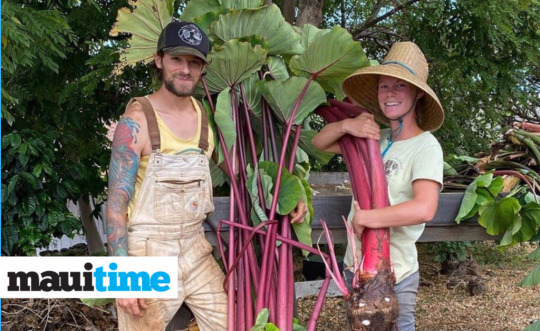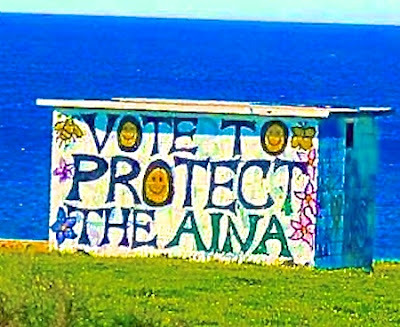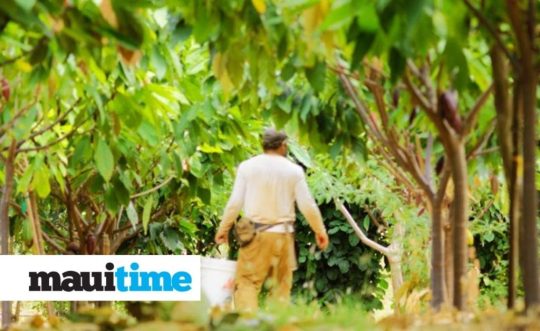#Maui County Farm Bureau
Explore tagged Tumblr posts
Text
Small Farmers Say Vote YES to Maui County Department of Agriculture
Small Farmers Say Vote YES to Maui County Department of Agriculture

Small Farmers and Local Food Advocates Support a Maui County Department of Agriculture
A message to you from Maui’s small farmers: Please VOTE YES on the charter amendment to create a Maui County Department of Agriculture.
By now, you’ve probably received the glossy postcard, seen the big banners or heard the radio ads asking you to vote no on a county ag department. Who paid for those?
View On WordPress
#Hawaii Farmers Union#local farms#maui county department of agriculture#Maui County Farm Bureau#maui farmers union#small farms
0 notes
Photo

Mayor Announces New Program Amid Covid-19 Mayor Victorino has set up a program for food distribution. Maui County Farm Bureau will use $20,000 weekly to purchase food from local farms for food distribution sites around the county – similar to the produce giveaway organized by Pukalani Superette on March 30.
#bob hansen#clint hansen#corona virus#covid-19#donna hansen#economy#events#maui#maui county farm bureau#maui hawaii#Maui Luxury Real Estate LLC
0 notes
Text
FROM YESTERDAYʻS FREE HAWAI`I TV - "TO REBUILD THE ECONOMY, FOCUS ON A HAWAI`I-GROWN INFRASTRUCTURE"

Honolulu Civil Beat - April 26, 2020 - By Koohan Paik-Mander
The Hawaii House of Representatives Select Committee on COVID-19 Economic and Financial Preparedness has announced that it has been holding briefings with business, government, nonprofit, and labor leaders for several weeks to plan for a post-coronavirus economy in Hawaii.
Then, on April 8, Gov. David Ige introduced Resolution No. 54, which establishes the related Hawaii Economic and Community Recovery task force.
House Speaker Scott Saiki offered his full-throated support -
This pandemic has reaffirmed what we have known for awhile — that our economy must be diversified and cannot be over-reliant on one or two major industries. This task force must help modernize our economy. The future of our families and state relies upon a sound and resilient economy.
We, the undersigned (see below), are concerned that there are no farmers, or groups that represent Native Hawaiians and everyday working people on the task force that will determine our collective economic future.
It is critical to examine what Saiki means when he talks about a “sound and resilient economy” for Hawaii. We cannot turn a blind eye to the fact that unemployment claims nationally have ballooned to 26 million as of April 23 and are still growing.
Wildcat strikes are flaring up across the U.S., and businesses are folding by the thousands. And the cascading effect is just beginning.
The world as we have always known it, is unraveling. We are heading toward no less than a second Great Depression, with no way of knowing how to predict what a post-pandemic world would even look like.
However, we know one thing for certain: that Hawaii’s first priority is to get to feeding itself, as quickly as possible. Right now, Hawaii imports 90% of its food, which is growing scanter by the week as supply chains fizzle out, under the pressure of a pandemic-crippled global economy.
Change Must Be Strategic
We also know that it is very much in the realm of possibility that we may be slammed by another freak event just as unforeseen as COVID-19. It may be a climate event. It may be a political event. It may be another pandemic, or perhaps a series of pandemics, as has been predicted.
Given the reality that it is unlikely that we can ever go back to “normal,” it is of utmost urgency that the first step in rebuilding a post-pandemic economy is to focus entirely on building a Hawaii-grown infrastructure focused on feeding Hawaii. That would ensure that, regardless of what disaster comes our way, at least we will have laid the groundwork for maximum resiliency, to avoid widespread starvation in Hawaii.
Such a food-security infrastructure would include massive education funding, capital improvement projects, and support for all aspects of regenerative farming, which if done correctly, diverts waste from the landfills and produces healthy soil that captures carbon from the atmosphere. It would also mean a living wage for all, and would help to strengthen the economic vitality and resiliency of rural communities.
Token actions will not suffice. Change must be strategic, systemic and wide-sweeping, and on an order of magnitude equal to the Great Mahele. We must mobilize immediately to create jobs and policy that will serve our people now, as well as over the next seven generations.
The Green New Deal, with agriculture as Hawaii’s “jewel in the crown,” is the best approach to creating a thriving food-secure economy. It would support a livable planet by creating an inclusive, decentralized, equitable economy that considers environment, labor, education, disability rights, women’s rights, veterans’ rights, and others.
No one should be compelled to work at a job that harms either their health, the health of their family, or the health of the planet. Such an economy would embrace the wisdom of native peoples, and their rights, as clearly set forth in the UN Declaration on the Rights of Indigenous People.
These multiple facets are often viewed as “pesky obstacles” from a corporate, profit-margin perspective, but that short-sighted paradigm has proven to be severely flawed. Now, we must think holistically and include the diverse needs of Hawaii’s own local communities first, rather than profits. This, by its very definition, is the fabric of resiliency.
Now is the time to craft an economy that works for everyone. Hawaii is already home to thousands of farmers; we must support them, instead of providing sweetheart deals to out-of-state corporations.
Our own farmers know, better than anyone, what they need to do to grow healthy local food. Yet farmers’ voices are rarely at the table in the halls of power. You will find many of those voices signed below.
Hawaii Can Feed Itself
Further, we must support an education infrastructure that supports young people to prosper by studying regenerative agriculture, such as offering tuition-plus-stipend for agriculture students. Hawaii can feed itself, if we want to do so.
Simply put, COVID-19 and other potential pandemics are sending us into uncharted waters. If we care about Hawaii’s future for all her people, we must build an infrastructure of regenerative agriculture right now that provides a livable wage to island families.
This would be the required foundation for a modernized economy. This would be how to truly support local farmers and all the associated peripheral businesses – suppliers, value-added cottage industry products, cafes, restaurants, etc.
Last year, members of the caucuses for the environment, labor and education of the Democratic Party of Hawaii came together to form the Green New Deal working group. We drafted 27 bills distributed among eight sectors. In addition to agriculture, sectors included ecosystem restoration, education, energy, waste management, health and human services, housing, and transportation.
Each Green New Deal bill was prefaced with the following preamble (adjusted to include “pandemic” as one of the climate-induced global crises):
The Legislature finds that the human-induced global climate crisis requires thoughtful but bold response on many fronts to make Hawaii communities resilient to the impacts of pandemics, storms, floods, fire, and sea-level rise that threaten the very survivability of these fragile islands.
Lest Hawaii lose its leadership position in meeting the future, and in the arenas of labor, justice and equity, the Legislature embraces Aloha Aina to decarbonize Hawaii’s systems of food, energy, and transportation, and to sequester carbon through systems of agriculture, waste management and ecosystem restoration.
The good jobs created thereby also expand access to health, housing and education, ensuring justice and equity for Hawaii’s citizens. The following measure represents a forward step in mitigating and adapting Hawaii to inevitable change.
We, the undersigned, request that Resolution 54’s economic task force make the Green New Deal central to its strategic plan. We also request that the task force and its Special Committee include regenerative farmers, indigenous groups, zero-waste experts, and members of the Democratic Party of Hawaii Green New Deal Working Group.
For more information about the Just Transition Hawaii Coalition, please send an email to [email protected].
The Just Transition Hawaii Coalition - Kawika Pegram, executive director, Hawaii Youth Climate Coalition; Lanakila Mangauil, executive director, Hawaiian Cultural Center of Hamakua; Hector Valenzuela, Vegetable Crops Extension Specialist, UH Manoa; Ku Kahakalau, indigenous educator, Waipio Valley; Nalei Kahakalau, traditional kalo planter, Waipio Valley; Jason Bradshaw, Hawaii Democratic Party Labor Caucus, Chair; George Kahumoku, Native Hawaiian planter of over 300 varieties of fruits, veggies, laau lapaau herbs and teas, rancher of cattle, sheep, goats chickens and ducks, cultural practitioner, five-time Grammy winner; Kealia Farms dba Kahumoku Farms, Lahaina, Maui; Samuel and Tyrell Kapoi, SK Global Inc. – Kalo Bombs, ‘Ohana O Hāloa, Puea, Waianae; Nalani Kaneakua, Limu Farmer/Koʻolau Limu Restoration Project, Anahola, Kauai; Kapena and Ku‘ulei Worden, Worden ‘Aina Farm, Waianae; Lana Olson, Hawaii Democratic Party Environment Caucus Chair; Jeff McKnight, Hawaii Democratic Party Environment Caucus Secretary; Yoshito L’Hote, executive director, ‘Aina Hookupu o Kilauea, Kauai; Meleana Judd-Cox, farm manager, Waihuena Farm, Oahu; Koohan Paik-Mander, Pacific Earth Institute, Hamakua, Hinaleimoana Wong-Kalu, kumu and community leader, Oahu; Hawaii Ulu Producers Cooperative (over 90 farms), Hawaii Island; Jenny Pell, Board member of Food Security Hawaii, and Project manager of ‘Ohana Gardens, Maui; Bryan and Natalie Mesa, De La Mesa Farms, Waimanalo, Kristine Kubat, president, Recycle Hawaii, Hilo; Ikuko Kay Kurata, farmer and beekeeper, Hawaii Makoa, LLC, Hamakua; Steve Dias, farmer/rancher, Dias Farm and Ranch, Hamakua; Anna Maria Kapua, farmer/rancher, Dias Farm and Ranch, Hamakua; Robert Kapua, farmer/rancher, Dias Farm and Ranch, Hamakua; Colehour Bondera, farmer of Kanalani Ohana Farm certified organic, Board of Directors of Kona Coffee Farmers Association President, Board of Directors of American Origin Products Association Board Member of Kona County Farm Bureau; Bruce Corker, farmer of Rancho Aloha organic coffee farm; Chet Gardiner, Cassandra Farms, Honomalino, vice president of Kona Coffee Farmers Association and member of Farmers and Ranchers for a Green New Deal; Ikaika Hussey, UNITE HERE Local 5 organizer, founder of ‘Iliʻili, a multi-stakeholder cooperative working on strengthening Hawaii’s economy through investments in decarbonization, food security and smarter urbanism, Kalihi, Oahu; Leilani Lindsey-Kaapuni, president of Hui Aloha ʻĀina; Lisa Hinano Rey, Agroforestry Farmer, Policy Entrepreneur, STEM Educator, Windward Community College, Oahu; Janine Holstein, farmer/owner, Maui Majesty, Kula, Maui; Dash Kuhr, Starseed Ranch, Kohala, Hawaii Island, Becky Gardner, candidate for House District 20, St. Louis Heights, Palolo, Maunalani Heights, Wilhelmina Rise, Kaimuki; Jeremy Hillstrom, True Leaf Farms Inc., Moloaa, Kauai; Bradford Ikemanu Tin Cheong Lum, Kumu Hula and Kahu, Halau Hula O Ikemanu, Honolulu; Bart Dame, Democratic National Committeeman for Hawaii; Fern Anuenue Holland, Kauai; Shannon Schultz, BEEing Aloha Honey Co., Hawaii Island; Carl McKinney, Farmer, Hawaii Island Goat Dairy, Honokaa; Kim Coco Iwamoto, Enlightened Energy, LLC; Rev. M. Kalani Souza, cultural practitioner, Paauilo; Raymond Catania, labor advocate, Kauai; Ana Nawahine-Kahoʻopiʻi, Kumu hula, DHHL beneficiary, backyard farming design, Kupuna Council of Aloha Aina Party; Blake Watson, Regenerative farmer and organic land manager, Glenwood, Hawaii Island; Maritez Libed, farmer, Tess Garden, Paauilo, Hawaii Island; Lori Beach, Executive Manager, Hamakua Agricultural Cooperative; Yuri Zhuraw, Farmer, Food Forest Farm, Honokaa; Nancy Redfeather, farmer, Kawanui Farm, Honalo, Hawaii Island; Aunty Maxine Kahaʻulelio, Pastoral leaseholder, rancher, DHHL beneficiary, Kupuna Council of Aloha Aina Party; Albert Kahoʻopiʻi Jr., pastoral rancher, farmer, vertical growing designs, DHHL beneficiary; Ponoʻi Kahoʻopiʻi, farmer, vertical growing designs, DHHL beneficiary; Katy Benjamin, Barenaba Farm, Hiio; Daniela Spoto Kittinger, director of Anti-Hunger Initiatives, Hawaii Appleseed Center for Law and Economic Justice; Fiona Fong Weingartner, School Garden Educator, Honokaa; Tanya Yamanaka Aynessazian, Backyard farmer, Keaau, Hawaii Island; Jess Sobocinski, FoodCorps Hawaii Program Manager, Michael Manor, farmer, Mother Nature’s Miracle, Hamakua; Laura Markham, Big Island Creamery, Waimea, Hawaii Island; Kaitlyn Jacobs, Legislative Coordinator, Surfrider Foundation, Oahu chapter; Young Progressives Demanding Action, Honolulu; Henry Curtis, Life of the Land, Oahu; Axel Kratel, Carbon-capture regenerative farmer, Hilo; Tina Grandinetti, Hawaii Peace and Justice, UH Manoa; Joshua Cooper, Hawaii Institute for Human Rights, Kapahulu, Oahu, Noel Kent, Department of Ethnic Studies, UH Manoa; Thayne Taylor, Kauai Sea Farm, Kalaheo; Gerald Klappert, Farmer, Wailuku, Maui; Jack Lockwood, Puhau St. Farmers League, Hilo; Mille Kohl, Haiku, Maui; Michael deYcaza, Honolulu; Luella Nohea Crutcher, Waawaa, Oahu; Mark Chavez, climate justice advocate, Oahu; Lori Adolewski, Kaneohe, Oahu; Eric Bowman, Hamakua; Tina Wildberger, House District 11 Representative, South Maui.
#free hawaii tv#food security#food sovereignty#hawaiian kingdom#coronavirus#farming#just transition hawaii coalition
0 notes
Photo

New Event has been published on http://fullofevents.com/hawaii/event/maui-ag-festival-2/
Maui Ag Festival
The 10th Annual Maui County Agricultural Festival, Maui’s prime event to raise awareness about Maui ag while invigorating Maui ag, will take place on Sat., April 1. The entire industry, its allies, and supporters come together on the lü‘au grounds of Maui Tropical Plantation in Waikapü to share what each group does for the collective good of agriculture in the County, and to showcase ag’s vital role in the economy, environment, and lifestyle of Maui.
http://www.mauicountyfarmbureau.org/maui-county-agricultural-festival-2/
Hosted by Maui County Farm Bureau (MCFB) in partnership with Office of Economic Development, generous sponsors and industry allies, here is the opportunity to learn about agricultural issues and their impact on our day-to-day lives. Event hours are 9 a.m. – 4:30 p.m.; admission is $5 for adults (kupuna 65 and over free and keiki under 18 free as well). Free parking and shuttle transfers from Ma’alae’a side parking lot to main entrance to AgFest.
Families won’t want to miss this year’s “Maui Legacy Pancake Breakfast” from 8 am – 10:30 am. It’s bingo, a raffle and time to honor four Maui farmers who have contributed greatly to Maui’s agricultural industry. They are Peter Baldwin, Piiholo Ranch, Richard “Dick” Cameron, HC&S, Doug MacCluer, Maui Pineapple Company and Maui Gold Pineapple Company, and Dr. Wilbert Yee, Yee’s Orchard famous for its Goldenglow mangoes. One of the big highlights this year is the expanded “Keiki Zone” complete with bouncers, farm games, livestock exhibit, pony and horse rides and family-friendly food by Chef/Owner Chris Schobel of Fat Daddy’s Smokehouse BBQ. Alaka’i Paleka, Maui’s Morning Goddess of KPOA Radio returns as emcee at the entertainment stage with an awesome lineup and great giveways throughout the day.
Expanding on activities for the whole family, check out the “Keiki and Teens Cook for Heart” from 10:30 am – 1:30 pm. Chefs Paris Nabavi of Sangrita Grill and Cantina, Rob Mason Lyndon Hondon, and Riko Bartolome lead culinary classes from 10:30 am – 1:30 pm centered around three crops – avocado, tomatoes, bananas. This is all part of an American Heart Association program called “Keiki & Teens Cook for Heart”. The chefs have been in the several West Maui schools earlier this year teaching culinary classes in elementary schools and Lahainaluna High School.
More hands on activities found in flower tent. The general public is invited to make fresh flower lei, ipu, along with Gayle and team from Na Kani O Hula.
FARMER’S MARKET It’s good to know who grows our food. The market also shows the importance to ag of value-added products such as taro chips, pickles, and teriyaki beef: They stretch the season, absorb surplus, and provide extra farming revenue. Also check out MauiWine and Maui Gold tent and Maui Coffee Association. Both demonstrate the process of growing an agricultural product and producing a value-added product.
FOOD BOOTHS Humble crops transform into satisfying meals when carefully prepared. Sample the best of all natural beef – hamburgers, poke bowls and smoked meat, Fork to Salad, Roselani Ice Cream, Shaka Pops and local favorites chow fun and smoked meat and 100 % Maui beef burgers and fries. Look for Maui Fresh Streatery and Three’s Bar & Grill Food Truck.
KEIKI ZONE Kids learn about ranching and food production while at play. Join us for barnyard games favored by children around the world and learn about livestock. Horseback and pony rides, bouncers and Livestock Exhibit throughout the day. Keiki entertainment stage with live musical performances, magic show and more.
ASK THE DOCTOR Healthy soil and plants are key to successful farming. Maui can bring soil samples for analysis and learn about plant health or peer through a microscope for a close-up of bugs affecting our crops. With the University of Hawai‘i College of Tropical Agriculture and Human Resources specialists.
CENTER STAGE Taiko drummers, Kamehameha Schools Maui Campus –Ensemble, Honoka’a Jazz Band, Lehua Kalima and Shawn Pimentel, Napua Nakasone Greig and Halau Nalei Kaumaka O Uka, Kaina Country Band on stage from 9 am – 4:30 pm.
FARM VISITS Maui Tropical Plantation offers Tram Rides.
http://www.mauicountyfarmbureau.org/maui-county-agricultural-festival-2/
#hawaii #events #fullofevents
0 notes
Text
Eat Well • Buy Local • Maui County Farmers Markets
Eat Well • Buy Local • Maui County Farmers Markets
Thank you, Maui County Farm Bureau for providing such a detailed list of the local farmers markets. For those who prefer to buy fresh local produce, check out the farmers markets in the list below for some fantastically fresh farm to table produce!
West Maui
Farmers’ Market of Maui, Honokowai 3636 Lower Honoapi‘ilani Road Lahaina, HI 96761 808-669-7004 Monday, Wednesday, Friday, 7:00 am – 11:00 am
View On WordPress
#buy local#farm to table#farmers markets#maui#maui county farm bureau#maui farmers market#support local growers
0 notes
Text
Farmers Say No To Proposed County Department of Agriculture
Farmers Say No To Proposed County Department of Agriculture

Maui County Farm Bureau Member Poll Rejects Proposed Charter Amendment
The Maui County Farm Bureau (MCFB) announced the results of a recent member poll to determine how their farmers felt about the proposed charter amendment to establish a County of Maui Department of Agriculture. The results revealed a strong objection to the proposal with 84% of farmers & ranchers responding saying NO to the…
View On WordPress
#American Farm Bureau Federation#Clark Hashimoto#County of Maui Department of Agriculture#Farm Service Agency#Farmers#Hashimoto Persimmon Products#Hawaii Farm Bureau Federation#Maui County#Maui County Council#Maui County Farm Bureau#Natural Resources Conservation Service#Soil and Water Conservation Districts#State Department of Agriculture#State Department of Health#Teena Rasmussen#U.S. Department of Agriculture#UH College of Tropical Agriculture#UH College of Tropical Agriculture and Human Resources#Yuki Lei Sugimura
0 notes